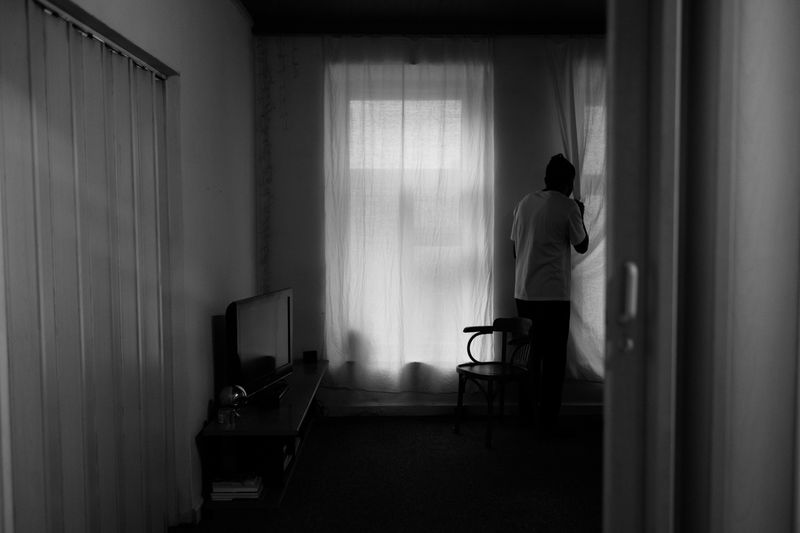10 Things Men Do That Slowly Isolate Them From the People Who Care Without Even Realizing It

Ever notice how some men gradually find themselves with fewer close relationships? It’s rarely a sudden change but rather a slow drift caused by habits they might not even recognize. These behaviors create invisible walls between them and the people who care most. Understanding these patterns is the first step to breaking them and building healthier connections.
1. Labeling Exes as “Crazy”

When a man consistently refers to former partners as “crazy,” he’s waving a relationship red flag. This habit reveals an unwillingness to acknowledge his role in past relationship failures.
People notice this pattern and quietly wonder if they’ll be the next person labeled “crazy” when things don’t work out. The blame-shifting creates a reputation for emotional immaturity.
Friends and family eventually stop offering relationship advice, knowing he’ll dismiss their insights. This defense mechanism might protect his ego temporarily, but ultimately leaves him without the honest feedback needed for personal growth.
2. Conversation Hijacking

Someone shares an exciting story about their promotion, and suddenly he’s talking about his work accomplishments from three years ago. The original storyteller’s moment vanishes.
This conversation redirection happens so automatically he doesn’t register the subtle eye rolls or topic changes that follow. People begin sharing less with him, tired of their experiences being overshadowed.
What could be meaningful exchanges become one-sided performances. The irony? His desire to seem interesting makes him increasingly uninteresting to others, who seek out more reciprocal relationships where their stories matter too.
3. Disrespecting Service Workers

The server brings the wrong order, and his tone shifts dramatically. The friendly demeanor he showed his companions transforms into condescension or impatience with the waitstaff.
Companions witness this Jekyll-and-Hyde moment and make mental notes. They recognize that how someone treats those in service positions reveals character fundamentals – respect, patience, and empathy.
This behavior creates immediate discomfort, but the long-term damage is worse. Friends begin declining dinner invitations or hesitate to introduce him to others, protecting both service workers and their own social reputations from his unpredictable rudeness.
4. Rejection of Correction

“Actually, I’m pretty sure I’m right about this.” The words come out automatically when someone points out his mistake, even when he’s clearly wrong about the movie release date or historical fact.
His fragile ego transforms simple corrections into perceived attacks. Rather than seeing feedback as helpful, he experiences it as criticism to be defended against at all costs.
Eventually, people stop correcting him altogether. Conversations become shallower as friends avoid topics where his defensiveness might emerge. The protective bubble he’s created prevents both meaningful dialogue and personal growth.
5. Casual Environmental Disregard

The empty coffee cup tossed from the car window seems like a minor offense to him. Just one cup, just one time – except it’s never just once.
This small action speaks volumes about his broader attitude toward shared spaces and responsibility. It signals a troubling self-centeredness: someone else will deal with my mess.
Those walking with him notice and feel uncomfortable by association. The behavior extends beyond littering into relationships – leaving emotional messes for others to clean up, assuming his comfort matters more than collective well-being. People gradually distance themselves from this carelessness.
6. Excessive Teasing That Cuts Deep

The joke about her cooking lands with an uncomfortable silence instead of laughter. He doesn’t register the hurt look that flashes across her face or how the atmosphere shifts.
His teasing frequently crosses the invisible line between playful banter and hurtful commentary. The targets of his “jokes” begin to guard themselves, sharing less and appearing more withdrawn around him.
What he perceives as harmless ribbing actually chips away at trust and emotional safety. The people who care about him start avoiding situations where they might become his next punchline, creating distance that grows with each cutting remark.
7. The “No Offense, But…” Preface

Those three words serve as his shield against accountability for whatever follows. “No offense, but that shirt makes you look heavier” – as if the disclaimer neutralizes the sting.
He genuinely believes he’s just being honest, offering helpful observations others are too polite to share. What he doesn’t see is how people increasingly guard themselves around him, sharing less and revealing fewer vulnerabilities.
Friends stop inviting him to certain gatherings where sensitive topics might arise. His brutal “honesty” creates emotional distance where connection could flourish, leaving him confused about why relationships feel increasingly superficial.
8. Dismissing Emotional Responses

“You’re overreacting” becomes his automatic response when faced with emotions he doesn’t understand or share. This dismissal seems logical to him – the situation doesn’t warrant such intensity in his view.
What he misses is how this response invalidates others’ experiences and creates emotional distance. People learn their feelings won’t be respected around him.
The pattern extends to his own emotions too, which he often suppresses or ignores. This emotional unavailability makes deep connection impossible. Friends and partners eventually seek emotional support elsewhere, leaving him wondering why his relationships lack intimacy.
9. Chronic Excuse-Making

The late arrival comes with an elaborate story about traffic, despite this being the third time this month. His explanations for missed deadlines or forgotten commitments grow increasingly creative.
Each excuse seems reasonable in isolation, but the pattern reveals something deeper: an unwillingness to take responsibility. Friends and colleagues notice the habitual blame-shifting to external circumstances.
Trust erodes slowly but surely. People stop depending on him for important matters or adjust their expectations downward. His relationships become increasingly superficial as others protect themselves from disappointment, while he remains puzzled why he’s no longer included in meaningful plans.
10. Minimizing Others’ Achievements

His friend announces a promotion, and his first response is, “Well, they were probably desperate to fill the position.” The subtle undermining happens so automatically he doesn’t even recognize it.
This habit stems from insecurity – others’ successes feeling like a mirror highlighting his own perceived shortcomings. Rather than celebrating their wins, he subtly diminishes them.
People notice and begin sharing good news elsewhere first. They create distance to protect their accomplishments from his dampening effect. The irony is painful: his fear of being outshined leads to exactly what he fears – being left out as others build more supportive connections.

Comments
Loading…